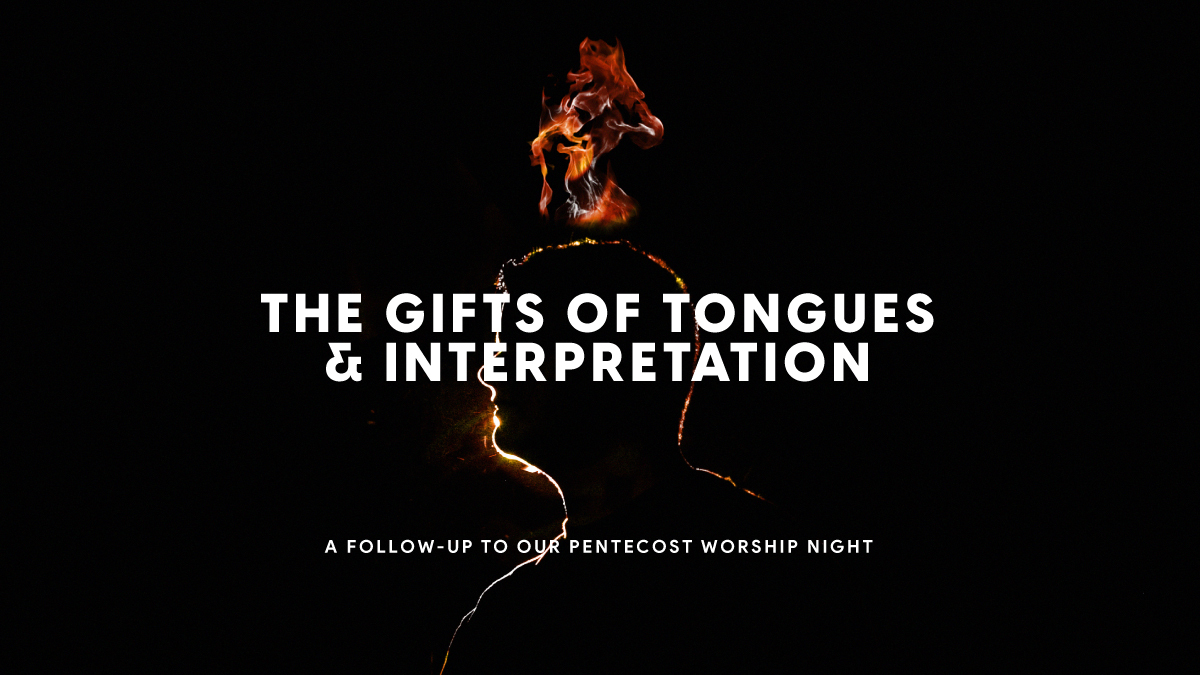Does the gift of tongues still happen today or has that gift ceased? What is the purpose of the gift of tongues? If someone speaks in tongues in a gathering of Christians should there be an interpreter? What if there isn’t one?
As I write this post the day after our Pentecost Worship Night I am still basking in the glory of it all. Our Sunday morning services included a sermon on Pentecost (Acts 2) as the great reversal of Babel (Genesis 11) and how the Holy Spirit that fell upon the first Christians continues to dwell in all believers today. Then we gathered in the evening to share a meal, sing God’s praise, hear testimonies of the Spirit’s work in our lives, and pray together. There was such a tangible presence of the Holy Spirit among us.
The Gift of Tongues
The Greek word translated “tongues” in english literally means “languages” and the gift of tongues is speaking in a language that the speaker otherwise does not know, whether another earthly language (Acts 2:6) or a heavenly language (1 Corinthians 13:1; 14:2).
Proper Use of Spiritual Gifts
The Apostle Paul lists many of the spiritual gifts and proper use of the gifts in 1 Corinthians 12-14. There he outlines that all spiritual gifts must be empowered “by one and the same Spirit” (1 Cor. 12:11), that they are given “for the common good” (1 Cor. 12:7), and that they are all to be used for “edification” (1 Cor. 14:26), ultimately, for the building up of the church.
Theological Word of the Day: Continuationist
One of the theological debates in the church today is whether or not the miraculous gifts (e.g. miracles, prophecy, etc.) continue to this day or have ceased. Cessationists generally believe that the miraculous gifts ceased around the time of the death of the Apostles. Continuationists believe that the miraculous gifts continue today, although to varying degrees in different times and places. Cessationists and continuationists alike agree that the non-miraculous gifts of the Spirit continue to be appointed to all believers as the Spirit wills (eg. hospitality, encouragement, evangelism, etc.). Central believes that spiritual gifts continue to be given to equip the church to carry out its ministry until Christ returns. When Paul says, “you are not lacking in any gift, as you wait for the revealing of our Lord Jesus Christ, who will sustain you to the end” (1 Cor. 1:7-8), he seems to be saying that gifts are given to the church for the period between the ascension of Jesus and His return. While this is our church’s theological position on gifts of the Spirit we certainly welcome into our church family those who hold a different view, recognizing that this is not a first order doctrine (salvation issue).
A Word in Tongues at the Worship Night
At one point during the open mic sharing time one of our pastors shared a word with us in tongues. Earlier in the week he reached out to me, with a sense that he should do so at the gathering, and asked if I would be okay with it. His aim was for the building up of the church and called me out of a desire for unity and to be submissive. We agreed that sharing a word in a tongue was a good thing invited by Scripture (1 Cor. 14:27, 39), that we would seek an interpretation, and if there wasn’t one, that we would refrain from utilizing the gift of tongues in the gathering, as clearly instructed in Scripture (1 Cor. 14:28).
Do you see the tension in this? Paul says, “I want you all to speak in tongues” (1 Cor. 14:5) and “do not forbid speaking in tongues” (1 Cor. 14:39) but that “if there is no one to interpret, let each of them keep silent in church and speak to himself and to God” (1 Cor. 14:28). How do we know if there will be an interpretation? It seems that we will know when someone speaks in tongues and then we ask for an interpretation. If there is one, praise God! That prophetic word will now be edifying and for the building up of the whole congregation (1 Cor. 14:1-5). But if there is not someone to interpret we should cease any more speaking in tongues because it will not serve to edify and build up the church. When an interpreter did not come forward on Sunday night we moved on from the brief prophesying prayer in tongues.
Interestingly, three individuals later came forward saying they had an interpretation (two at the end of the night) and one sent an email later in the evening. The one individual I talked to at the end of the evening sensed God saying “YOU” when I asked if anyone had an interpretation. That said, this was new for her and she didn't feel like she was completely clear on the word to share. Another individual said that he didn’t come forward because he felt the word was something for Central’s leaders.
I liken yesterday evening to a toddler learning to walk or a child riding without training wheels for the first time. It’s a bit shaky but it’s the only way we learn to be faithful to Scripture and walk by the Spirit, while not quenching the Spirit! (1 Thess. 5:19-20).
And here’s our commitment as Central’s leadership: We will follow the instructions for orderly worship outlined in Scripture, whether that be around the Lord’s Supper (1 Cor. 11), Spiritual Gifts (1 Cor. 12), Prophecy and Tongues (1 Cor. 14), and so on.
And can I just say, what a privilege to pastor a church rooted in the Bible and empowered by the Spirit! I treasure what God is doing among us for His glory, our flourishing, and the good of the eastern Fraser Valley.
Further Questions?
If you have further questions you can reach out to one of our pastors or send your questions to my executive assistant at michelle@centralcommunity.ca
Further Reading
If you would like to do further reading on the gifts of the Spirit I recommend the following:
- No particular text of Scripture lists all of the spiritual gifts but six different passages list specific spiritual gifts: Romans 12:6-8; 1 Corinthians 7:7; 12:8-10, 28; Ephesians 4:11; 1 Peter 4:11.
- Sam Storms, Understanding Spiritual Gifts: A Comprehensive Guide addresses common questions, confusion, and misunderstandings surrounding spiritual gifts.
- Wayne Grudem’s Systematic Theology (chapters 52-53) on Gifts of the Holy Spirit: General Questions and Specific Gifts is an excellent resource for further study.
Got questions? We'd love to answer them!
Please contact Michelle Esau | Executive Assistant - michelle@centralcommunity.ca


